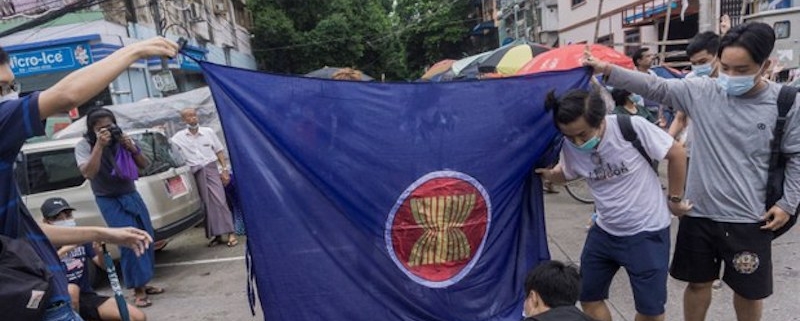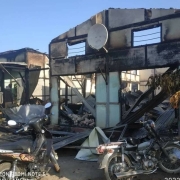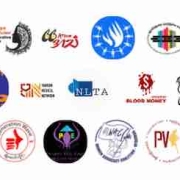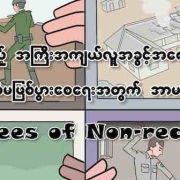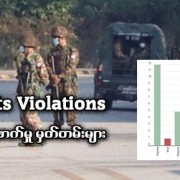Indonesia pushes to implement failed Myanmar peace plan ahead of ASEAN meetings
The crisis in Myanmar is expected to be one of the main topics at meetings hosted by Indonesia next week.
ASEAN chair Indonesia said Friday it was increasing efforts to implement a five-point consensus to end instability in post-coup Myanmar, while Burmese civil society groups called for junking the “ineffective” plan amid divisions within the regional bloc.
The crisis in Myanmar is expected to be one of the main topics at a series of ministerial-level meetings that Indonesia will host next week as the 2023 chair of the Association of Southeast Asian Nations. The talks will involve ASEAN members and other countries, including the United States, China and Russia.
Jakarta has been communicating with all parties in Myanmar to persuade them to support implementing the consensus, Indonesian Foreign Minister Retno Marsudi said.
“We have conducted 110 engagements, in the form of in-person meetings, virtual meetings, and phone calls, including my own face-to-face meetings with both the NUG and SAC foreign ministers on several occasions,” Retno told reporters, referring to the National Unity Government, the shadow civilian administration, and the junta, which calls itself the State Administration Council.
ASEAN leaders agreed on the consensus during an emergency summit in April 2021, but the Southeast Asian bloc has since been heavily criticized for inaction in pressing ahead with the five-point plan.
It aims to reduce violence in Myanmar after the Burmese military toppled an elected government in February that year. The plan demands an immediate halt to violence, a constructive dialogue among all parties, the appointment of a special envoy, the delivery of humanitarian assistance and the visit of a delegation to Myanmar.
The junta agreed to this consensus but reneged on it, prompting ASEAN to exclude any representative from the Myanmar junta from its meetings, starting in October 2021.

‘Most ASEAN states have no interest in democracy’
Meanwhile, a network of Burmese civil society groups, which calls itself Myanmar Spring’s young revolutionaries, said the exclusion was a mirage, because Indonesia, through its office of the special envoy, was engaging with the junta.
“[T]he Special Envoy’s official engagement with the illegal military junta is inconsistent with ASEAN’s decision and stance to exclude and ban members of the military junta from all high-level ASEAN meetings,” representatives of several civil society groups told Ngurah Swajaya, the head of the special envoy’s office, according to a statement issued Friday.
The groups’ representatives had met with Ngurah on Monday.
“[T]he representatives expressed their concern and frustration over the ineffectiveness and failure of ASEAN to stop the terrorist military junta’s violence and atrocities against Myanmar people over the past two years since the adoption of the Five-Point Consensus (5PC) on 24 April 2021,” the statement said.
They also conveyed to Ngurah that “the ineffective 5PC will only embolden the terrorist junta to commit further crimes and exacerbate the plight of the people of Myanmar.”
Indonesia’s president, too, acknowledged in May that there had been no progress in implementing the peace plan.
All along, Myanmar’s junta has cracked down on mass protests, killed more than 3,000 people and arrested thousands more, according to human rights groups. The United Nations said more than 1.8 million people had been forced to flee their homes in Myanmar because of violence since the coup.
And yet, ASEAN “continues to stick to a plan agreed in April 2021 that has palpably failed,” said CIVICUS Lens, a group that analyzes current events from a civil society perspective.
“A major challenge is that most ASEAN states have no interest in democracy. Half of them are outright authoritarian regimes, and the other half could be characterized as democracies with flaws – sometimes serious flaws,” the group wrote in an article in late June.
“Continuing emphasis on the 5PC as the baseline consensus, however, hasn’t masked divisions among ASEAN states. … But the fact that they’re formally sticking with it enables the wider international community to stand back and do little, on the basis of respecting regional leadership and giving the 5PC a chance.”
Of ASEAN’s 10 members, Brunei, Cambodia, Laos, Myanmar and Vietnam are not democracies, and Thailand’s outgoing government first came to power much like the current Myanmar junta, via a military coup.
CIVICUS Lens also noted Thailand’s decision to break ranks with ASEAN and engage in talks with the Myanmar military.
Indonesia on Friday again dismissed the Thai meeting in June as not a formal one.
“Regarding the informal meeting in Thailand, once again it was an informal meeting of ASEAN and only the foreign minister of Laos attended. The 5PC is the main track for resolving the Myanmar issue,” Foreign Minister Retno said.
However, in addition to Thailand and Myanmar, representatives of ASEAN members Brunei, Cambodia, Laos, Vietnam, and the Philippines – as well as India and China – attended the meeting in Pattaya.
Some experts say that ASEAN’s approach to Myanmar reflects its limitations as a consensus-based organization that prioritizes stability and non-interference in its members’ domestic affairs.
Additionally, while Jakarta should be praised for holding so many meetings with different stakeholders, it was impossible to assess the progress of its diplomatic engagements as they were confidential, said Hunter Marston, a researcher at the Australian National University.
“It’s also possible that the Indonesian government has underestimated the degree to which the current conflict is entrenched and the unwillingness of the warring sides to consider a peaceful settlement that does not include the complete eradication of the other side,” he told BenarNews.
He said that the outcome of Indonesia’s efforts remained uncertain.
“If nothing materializes by the end of Indonesia’s chairmanship, however, then everyone will point and say, ‘See? There was never a chance of progress to begin with’,” he said.

